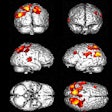
Women represent 60% of all patients with Alzheimer's disease (AD) dementia, yet there is a dearth of published data on sex differences in clinical trial participants, according to authors of a viewpoint published May 8 in JAMA Neurology.
"We call for comprehensive investigations into sex differences associated with treatments in existing AD (and related dementia) clinical trials and integrating these considerations into future trials," wrote lead author Rachel Buckley, PhD, a neurologist at Harvard Medical School, and colleagues.
Notably, on closer inspection, supplementary data supporting the recent U.S. approval of the drug lecanemab revealed that cognitive benefits of the drug were evident primarily in men, according to the authors. In addition, this was similarly observed in clinical trials for aducanumab, in which reduced cognitive decline was evident in men but not in women, they wrote.
While these trials had a balanced representation of female enrollment, sex-disaggregated analyses were not expanded in the main reporting of the trial results, particularly when examining sex-by-treatment interactions, the authors wrote.
"These preliminary findings support mounting evidence that drug efficacy, including pharmacokinetics and pharmacodynamics, can be affected by biologic sex," the authors wrote.
In addition, previous brain PET studies analyzing tau neurofibrillary tangles in patients -- a hallmark of the disease -- have documented higher tau burden in women relative to men, and transcriptomes associated with the X chromosome have also been implicated in Alzheimer's disease pathogenesis in a sex-specific manner, according to the authors.
Ultimately, analyzing potential sex differences in Alzheimer's disease trial data is crucial to ensure that the effects of new treatments are understood before being prescribed, they suggested.
"Understanding potential bases of the differences in therapeutic effects will require further exploration of the clinical trial data, as well as targeted efforts to examine sex-specific treatment effects in future trials," the group concluded.
Buckley's co-authors included Jessica Gong, of the University of New South Wales in Sydney, Australia, and Mark Woodward, PhD, of Imperial College London, both also of the George Institute for Global Health.





















